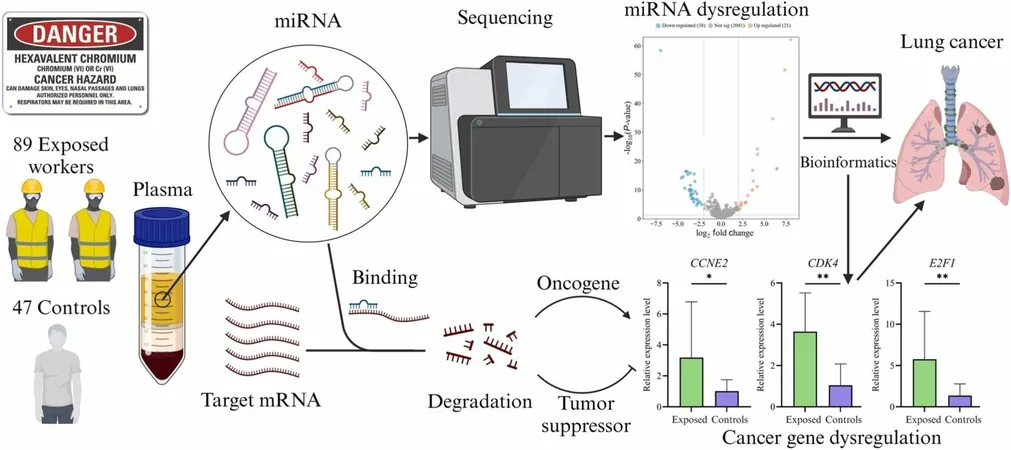
New Survey Reveals Alarming Link Between Alcohol Consumption and Cancer Awareness Among Americans
2025-04-02
Author: Wei
A recent national survey has shown a significant rise in the number of Americans associating alcohol consumption with an increased risk of cancer. Over half of U.S. adults now believe that regular drinking can lead to cancer later in life, a substantial jump from just 40% last year.
Conducted by the Annenberg Public Policy Center at the University of Pennsylvania between January 30 and February 10, 2025, this study questioned more than 1,700 adults about their perceptions of the health effects of alcohol. The results indicate that ongoing public health campaigns may finally be making a difference in public understanding.
Surgeon General’s Strong Message Resonates
The marked increase in awareness can likely be attributed to a recent advisory issued by the U.S. Surgeon General on January 3, 2025. This advisory explicitly stated that alcohol consumption is linked to at least seven types of cancers, including breast, colon, and liver cancer, and called for clearer warning labels on alcoholic beverages. The advisory gained extensive media coverage, which appears to have effectively resonated with the public.
Kathleen Hall Jamieson, director of the Annenberg Center, noted, “The Surgeon General’s synthesis of the science showing that alcohol consumption increases one’s risk of cancer got traction. This underscores the significant impact health officials can have on public behavior through clear communication.”
While other health reports were released around the same time, such as those from the National Academies of Sciences, Engineering, and Medicine, they failed to penetrate public awareness to the same degree, highlighting the effectiveness of the Surgeon General's message.
Impact on Drinking Habits
When survey participants were asked if recent reports changed their drinking behavior, nearly one in three (29%) indicated they would be less likely to accept a drink in social situations due to the associated cancer risks. Conversely, a majority (61%) reported no change in their drinking habits. Interestingly, 9% admitted they would be more inclined to drink after learning from the reports, with 73% of this group saying they would accept a second drink if offered.
Public Sentiment on Moderate Drinking
The definition of moderate drinking varies, generally considered to be one drink per day for women and up to two for men. Among those recalling just one report, 47% perceived moderate drinking as potentially harmful, while about 25% felt it highlighted both harmful and beneficial effects. Despite some lingering confusion, the overall trend suggests a shifting public perception about alcohol consumption and its health implications.
Looking Ahead: An Evolving Conversation
The increase in awareness surrounding the relationship between alcohol use and cancer represents a critical shift in public perception. As more individuals begin to connect daily habits with long-term health risks, opportunities may arise for health officials to enhance educational outreach, improve product labeling, and foster informed decision-making.
Despite these positive developments, a considerable portion of the population remains unsure about the risks of alcohol, which indicates that ongoing efforts are necessary. Health campaigns that provide clear and consistent information—such as the Surgeon General's advisory—are vital in empowering individuals to make healthier choices.
Ultimately, the challenge ahead lies not only in raising awareness but also in encouraging meaningful behavioral changes among the population. As the discussion about alcohol continues to evolve, equipping people with the knowledge they need to make informed decisions about their health will be essential.




 Brasil (PT)
Brasil (PT)
 Canada (EN)
Canada (EN)
 Chile (ES)
Chile (ES)
 Česko (CS)
Česko (CS)
 대한민국 (KO)
대한민국 (KO)
 España (ES)
España (ES)
 France (FR)
France (FR)
 Hong Kong (EN)
Hong Kong (EN)
 Italia (IT)
Italia (IT)
 日本 (JA)
日本 (JA)
 Magyarország (HU)
Magyarország (HU)
 Norge (NO)
Norge (NO)
 Polska (PL)
Polska (PL)
 Schweiz (DE)
Schweiz (DE)
 Singapore (EN)
Singapore (EN)
 Sverige (SV)
Sverige (SV)
 Suomi (FI)
Suomi (FI)
 Türkiye (TR)
Türkiye (TR)
 الإمارات العربية المتحدة (AR)
الإمارات العربية المتحدة (AR)